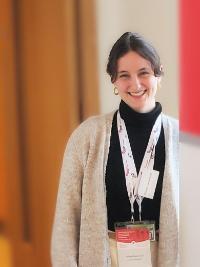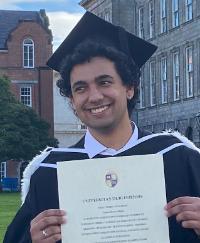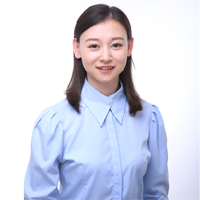Camille graduated from the University of Bordeaux with a Bachelor's degree in Chemistry, majoring in drug development. Her final year project focused on the organic synthesis of borylated agents for reticulation in vitrimers, with applications such as hydrogels, at the institute of molecular sciences in Bordeaux, France.
Camille pursued her studies at the University of Strasbourg, where she obtained a Master's degree in Chemistry, Biology, and Drug Development. During her Master's program, she undertook an internship in her first year on the synthesis of novel antibacterial agents targeting the last enzyme of the Methyl Erythritol pathway at the Lebel Institute in Strasbourg, France.
In the last year of her masters, she worked on the development of multifunctional superparamagnetic nanoparticles for biological applications in CBNI.
In January 2024, Camille joined the Centre for BioNano Interactions (CBNI) to begin her PhD studies. Her research, titled "Bio-inspired Particle Architecture Delivery Technologies" focuses on bio-sourced nanostructures from algae and the behavior of extracellular vesicles within the gut barrier.
 Aisling joined CBNI in June 2018 as a PhD student. Her research focuses on the development of nanoprobes for the characterisation of the protein corona of nanoparticles.
Aisling joined CBNI in June 2018 as a PhD student. Her research focuses on the development of nanoprobes for the characterisation of the protein corona of nanoparticles. Chiara graduated from the University of Urbino in 2021 with a bachelor's degree in Biological Sciences and 2023 with a master's degree in Medical Biotechnology. During her academic career, she undertook an experimental thesis investigating the effects of iron starvation on the growth of the pathogenic bacterium Staphylococcus aureus under the supervision of Prof. Emanuela Frangipani. Chiara joined CBNI in June 2024, first as a research assistant and then as a PhD student. Her PhD project focuses on the structural and functional characterization of bacterial-derived extracellular nanostructures and their role in mediating host-cell communication.
Chiara graduated from the University of Urbino in 2021 with a bachelor's degree in Biological Sciences and 2023 with a master's degree in Medical Biotechnology. During her academic career, she undertook an experimental thesis investigating the effects of iron starvation on the growth of the pathogenic bacterium Staphylococcus aureus under the supervision of Prof. Emanuela Frangipani. Chiara joined CBNI in June 2024, first as a research assistant and then as a PhD student. Her PhD project focuses on the structural and functional characterization of bacterial-derived extracellular nanostructures and their role in mediating host-cell communication. Andrea Lombardo holds a BSc in Physics from the University of Palermo, Italy, with a thesis focused on the analysis of the optical luminescence properties of fluorescein and the effect of pH on the fluorescence response of the probe.
Andrea Lombardo holds a BSc in Physics from the University of Palermo, Italy, with a thesis focused on the analysis of the optical luminescence properties of fluorescein and the effect of pH on the fluorescence response of the probe. Andrea holds a BSc in Biological Sciences and graduated in 2022 from the University of Pavia with a Master’s degree in Molecular Biology and Genetics. His thesis project was carried out at the Maugeri Institute and focussed on the Glyphosate herbicides' toxic effect on thyroid cells. In 2023 he moved to Denmark and worked as a Research Assistant at the University of Copenhagen focussing on differential gene expression and stress tolerance in Tardigrades in Nadja Møbjerg's laboratory. In 2024 he worked as a Quality Control Technician with LC-MS, HPLC and GC/MS systems. Andrea Marcantognini joined CBNI in 2025 as a PhD student. His project focuses on Protein-RNA architecture in biological nanostructures.
Andrea holds a BSc in Biological Sciences and graduated in 2022 from the University of Pavia with a Master’s degree in Molecular Biology and Genetics. His thesis project was carried out at the Maugeri Institute and focussed on the Glyphosate herbicides' toxic effect on thyroid cells. In 2023 he moved to Denmark and worked as a Research Assistant at the University of Copenhagen focussing on differential gene expression and stress tolerance in Tardigrades in Nadja Møbjerg's laboratory. In 2024 he worked as a Quality Control Technician with LC-MS, HPLC and GC/MS systems. Andrea Marcantognini joined CBNI in 2025 as a PhD student. His project focuses on Protein-RNA architecture in biological nanostructures. Breno graduated from Trinity College Dubin in 2023 with a first class honours degree in Nanoscience. During the course of his studies he undertook internships in the synthesis and characterisation of novel nanomaterials with Professor Wolfgang Schmidt and Professor Valeria Nicolosi. His final year project was carried out with Professor Richard Hobbs on the characterisation of anti-icing properties of Humboldt and Gentoo penguin feathers.
Breno graduated from Trinity College Dubin in 2023 with a first class honours degree in Nanoscience. During the course of his studies he undertook internships in the synthesis and characterisation of novel nanomaterials with Professor Wolfgang Schmidt and Professor Valeria Nicolosi. His final year project was carried out with Professor Richard Hobbs on the characterisation of anti-icing properties of Humboldt and Gentoo penguin feathers.